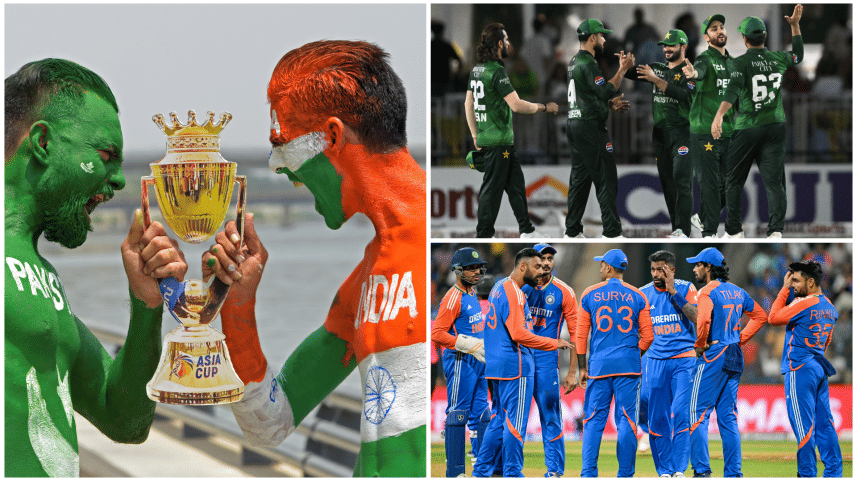New-look sides, same old rivalry: Much-anticipated Ind vs Pak clash tonight

When India and Pakistan meet -- in any sport -- the stakes spill over into something more than just a game. It becomes a clash between neighbours bound by political tension, history, and deep mistrust.
That will be the case again in the Asia Cup 2025, when Suryakumar Yadav's India, the defending champions, take on Salman Ali Agha's Pakistan tonight (8:30 pm Bangladesh Time) at the Dubai International Cricket Stadium.
Like many major events in recent years, the 17th edition of the eight-team tournament has not been spared by politics. Relations between the two nations worsened after the Pahalgam incident earlier this year, forcing hosts India to move the competition to the UAE so Pakistan could take part.
Once again, the Asian Cricket Council (ACC) has ensured that the Asia Cup maximises India-Pakistan encounters. Placed together in Group A alongside UAE and Oman, the two sides are likely to meet multiple times -- potentially thrice if they reach the final. It is another effort to give fans what they crave most: the high-voltage spectacle of the two sides colliding, even if bilateral cricket between the two sides remains suspended since the 2009 Mumbai attacks. With the Indian government recently formalising its sports policy on Pakistan -- ruling out bilateral series but allowing participation in multilateral events -- the stance appears to be a permanent one.
From a cricketing lens, both squads have one similarity as they arrive with fresh faces. The faces may have changed, but the rivalry retains its familiar edge -- if anything, intensified by the shifts in both camps.
For India, the tournament signals the beginning of the post-Rohit Sharma and Virat Kohli era. With seven changes from the 2024 T20 World Cup-winning squad, the Asia Cup doubles as a springboard for their 2026 T20 title defence.
Attention centres on the top order. Vice-captain Shubman Gill returns after a prolific IPL campaign, having earlier partnered with Abhishek Sharma in all five T20Is on the Zimbabwe tour. But in the past year, Abhishek and Sanju Samson opened in 12 straight T20Is. Both excelled individually -- Abhishek averaged 55.80 at a strike rate of 219.69 in 2025, while Samson became the first to hit three T20I centuries in a calendar year in 2024 -- yet their highest stand together was just 73. Gill's return forces a selection dilemma, compounded by Yashasvi Jaiswal's omission, which drew a lot of criticism.
India's middle order is stacked with options: Suryakumar, Tilak Varma, Hardik Pandya, Axar Patel, Rinku Singh, Shivam Dube, and Jitesh Sharma. Meaning, balancing batting depth with bowling utility will be key.
Jasprit Bumrah and Arshdeep Singh are certainties in the pace attack, leaving the spin combination -- likely between Kuldeep Yadav and Varun Chakravarthy -- to be settled.
Pakistan, meanwhile, are still seeking stability. Since their group-stage exit at the 2024 T20 World Cup, they have won only 12 of 26 games, beating Zimbabwe, Bangladesh (at home), and West Indies, but losing to stronger opponents such as Australia, South Africa, New Zealand, and once away to Bangladesh.
Their preparation, however, has been stronger than India's. Pakistan won a tri-series with UAE and Afghanistan just before the Asia Cup, while India played only five T20Is against England earlier in the year. Adding to their confidence is the fact that all of Pakistan's group matches are in Dubai, where they have lost only four of their last 13 T20Is.
Their batting, however, remains fragile. Even though the omission of Babar Azam and Mohammad Rizwan -- criticised for low strike rates and struggles against spin -- was expected, it left an untested middle order. Captain Salman Ali's 124.53 strike rate this year reflects their conservative starts, while Hussain Talat and Khushdil Shah have underwhelming strike rates and averages.
There are, however, bright spots. Saim Ayub, despite inconsistency, is their top scorer since the 2024 World Cup. Sahibzada Farhan has been prolific in 2025, with four T20 centuries and three POTM awards in 10 games. Hasan Nawaz, meanwhile, has emerged as a key middle-order hitter. In 14 T20Is, he showed adaptability by batting in five positions, with a career strike rate of 175.64 that reflects his clean hitting and ability to clear the ropes.
Pakistan could hope for something from their spin department in UAE conditions. Abrar Ahmed and Sufiyan Muqeem form a mystery-spin duo, supported by all-rounder Mohammad Nawaz, even if his record against India remains uninspiring. The trio have combined for 53 wickets in 26 matches since the last World Cup.
For all their contrasts, both teams share a sense of renewal -- India refining a champion side, Pakistan still seemingly piecing theirs together. And yet, beyond cricket, their clash remains a mirror of the political and cultural gulf dividing the two nations.
Remarkably, India and Pakistan have never met in an Asia Cup final, despite repeated scheduling manoeuvres designed to create such a showdown. This time, with their revamped squads, could it finally happen?
If so, it would not only thrill fans but also fulfil the organisers' long-cherished dream. Whatever it says about cricket itself -- and the compromises made to stage this rivalry -- an India-Pakistan final would captivate the cricket-mad nations like few other events in sport.




 For all latest news, follow The Daily Star's Google News channel.
For all latest news, follow The Daily Star's Google News channel.
Comments